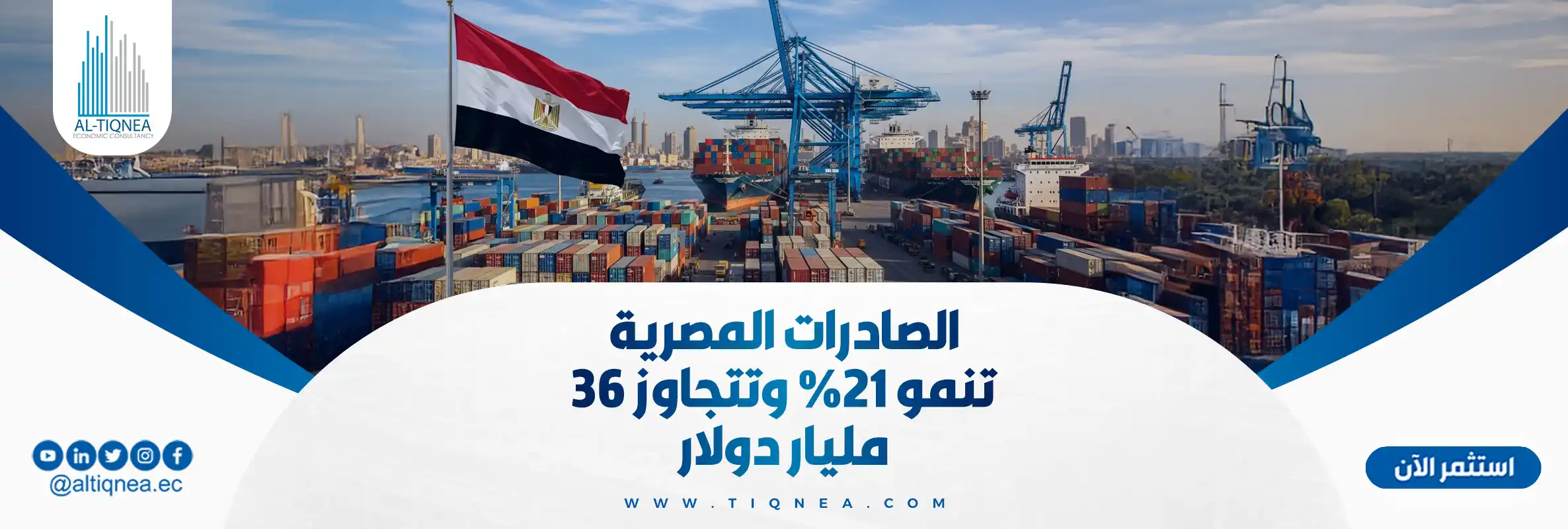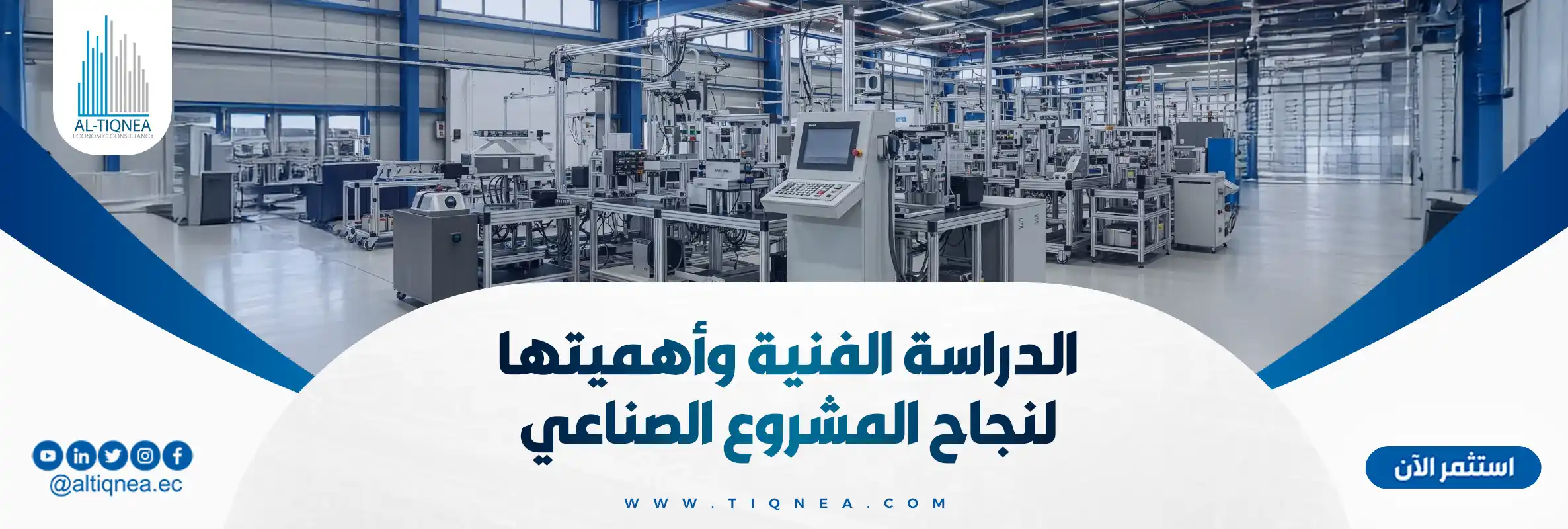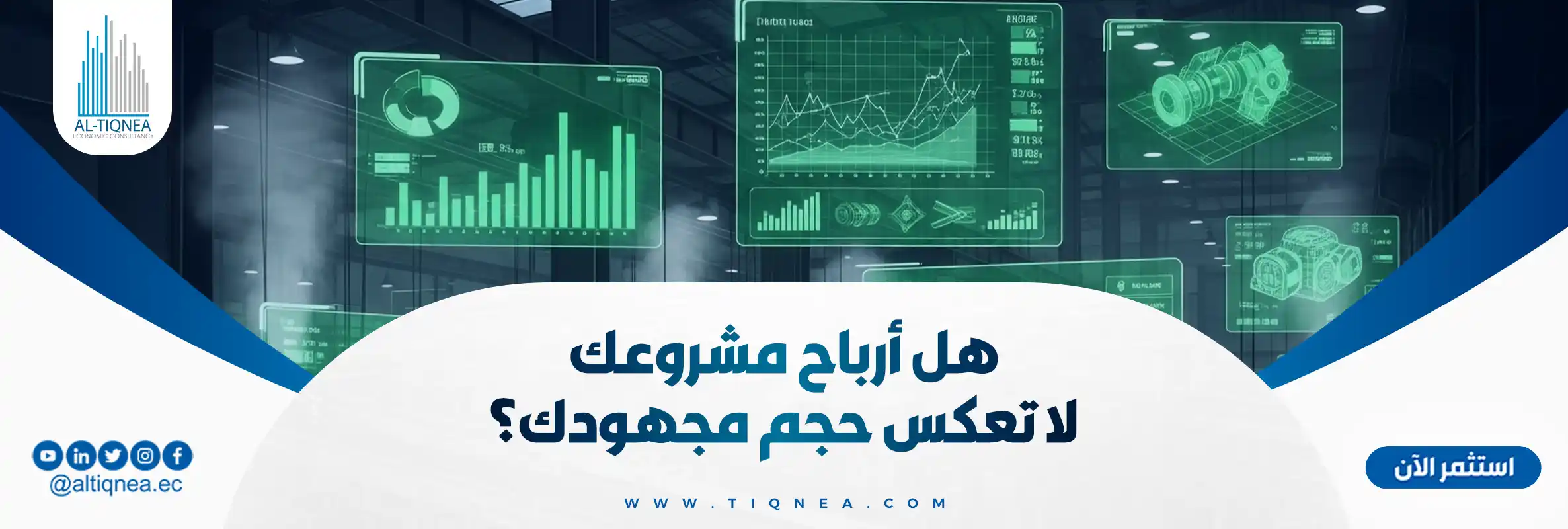شركة التقنية
- 24 أكتوبر
- 0 تعليق
- 105 مشاهدة

يأتي هذا المقال استكمالًا لمقالنا السابق “الدراسة الفنية وأهميتها لنجاح المشروع الصناعي”، والذي تناولنا فيه الدور المحوري للدراسة الفنية في تحديد قابلية تنفيذ المشروع على أرض الواقع.
وفي هذا المقال، ننتقل إلى مرحلة أكثر عمقًا من التحليل من خلال تناول تحليل الجدوى الفنية للمشاريع الصناعية، وهي الخطوة التي تحدد بدقة مدى كفاءة المشروع من الناحية التشغيلية والإنتاجية.
في شركة التقنية للاستشارات الاقتصادية، نعتمد على أساليب تحليل متقدمة لتقييم كافة الجوانب الفنية بدءًا من اختيار
نهدف من خلال هذا التحليل إلى تقديم صورة واقعية ومتكاملة عن مدى جاهزية المشروع الصناعي للتنفيذ، بما يضمن استثمارًا آمنًا وعائدًا مستدامًا لعملائنا.
شركة التقنية للإستشارات الإقتصادية، دراسة الجدوى وتنفيذ المشروعات.. شركة معتمدة رائدة في الاستشارات الاستثمارية والإدارية للشركات والمؤسسات المحلية والدولية، سابقة أعمال كبيرة من المشاريع ودراسات الجدوى الناجحة في مصر والوطن العربي.
لطلب دراسة جدوى مشروعك أو تحديد مقابلة تواصل معنا الان وسيتواصل معك أحد خبرائنا في أقرب وقت.
This article comes as a continuation of our previous discussion, “The Technical Study and Its Importance for the Success of Industrial Projects,” in which we explored the critical role of technical studies in determining the practical feasibility of implementing an industrial project.
In this article, we move to a deeper level of assessment through the technical feasibility analysis of industrial projects the step that precisely determines how efficient and viable a project is from operational and production perspectives.
At Al-Tiqnea Economic Consulting, we rely on advanced analytical methods to evaluate all technical aspects — 1. from selecting the appropriate technology,
2. to determining production lines and operating capacity,
3. to identifying the required human resources
4. and assessing the project’s needs for utilities and infrastructure.
Our goal through this analysis is to provide a realistic and comprehensive picture of the project’s readiness for execution, ensuring secure investment and sustainable returns for our clients.
1. Determine the required quantities of utilities and services (such as electricity, water, fuel, etc.) based on the quotation provided by the production line manufacturer, which specifies the actual consumption of these resources.
2. Estimate the operating costs of these utilities and services according to the rates set by the relevant government authorities for each type of service.
3. Include this data within the project’s technical study to ensure accurate cost estimation and a realistic, integrated operational feasibility analysis.
1. Explain the assumptions used to calculate the factory’s production capacity, specifying the number of daily shifts according to the nature of the project and the required production volume to meet the market gap.
2. Define the number of working hours per day and the number of annual operating days to ensure accurate estimation of total production capacity.
3. Determine the factory’s output volume and available capacity, indicating the actual operating rate during the first year, estimated based on the targeted market gap.
4. Prepare a projected production plan covering the entire project operation period (ten years), illustrating the factory’s total actual production capacity over the long term and ensuring alignment with future expansion and growth objectives.
1. Identify the types of raw materials and packaging materials required for project implementation, providing detailed technical specifications and confirming compliance with quality and production standards.
2. Collect data on raw material and packaging prices from various suppliers and estimate the unit cost for each component.
3. Calculate the total cost of the final product, including raw materials, packaging, and operating expenses allocated to each produced unit.
4. Determine the appropriate selling price in coordination with the marketing consultant, through a study of competing product prices in the market, to set a competitive price that also ensures profitable returns for the project.
1. Select the most suitable location for establishing the project according to the type of industrial activity and operational requirements, with a comprehensive assessment of the chosen land in terms of infrastructure, proximity to raw material sources, and target markets.
2. Specify whether the land will be owned (purchase) or leased (rent), with a clear cost estimate for each option — including purchase price or annual rent value.
3. Prepare a detailed layout plan for the project area, dividing the land into main zones such as: production line area, storage zones, parking spaces, and administrative buildings — ensuring optimal space utilization and smooth workflow.
Al-Tiqnea Economic Consulting — Feasibility Studies and Project Implementation.
A certified, leading firm in investment and management consulting for local and international companies and institutions, with a proven track record of successful projects and feasibility studies across Egypt and the Arab world.
To request a feasibility study for your project or schedule a meeting, contact us now and one of our experts will reach out to you as soon as possible.
الصادرات المصرية تنمو 21% وتتجاوز 36 مليار دولار شهدت الصادرات المصرية غير
تحليل الجدوى الفنية للمشاريع الصناعية يأتي هذا المقال استكمالًا لمقالنا السابق "الدراسة
الدراسة الفنية وأهميتها لنجاح المشروع الصناعي تُعد الدراسة الفنية أحد الأعمدة الأساسية
هل أرباح مشروعك لا تعكس حجم مجهودك؟ هل أرباح مشروعك أقل من
الآن هو أفضل وقت للاستثمار في مصر تعيش مصر حالياََ واحدة من
أهمية اختيار أفضل شركة لإعداد دراسة جدوى عند التفكير في تنفيذ مشروع





